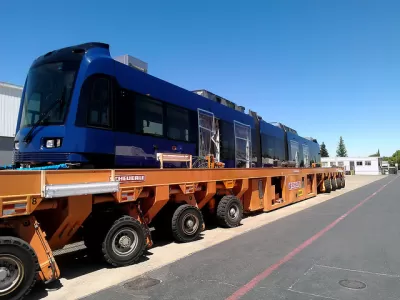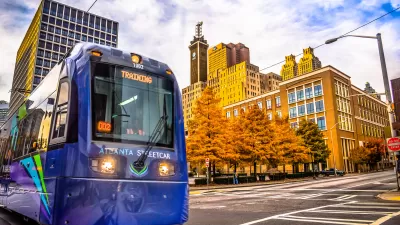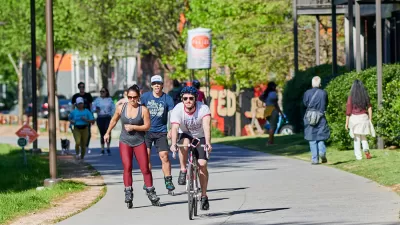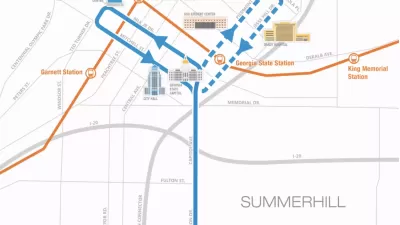It's 'back to the future' for Atlanta's $98 million investment that opened Dec. 30, although these will be modern, not vintage, streetcars that operate on a small loop. Streetcars last operated here in 1949. Mayor Reed intends to lengthen the route.

"Although the electric streetcars, condemned by some as a $98 million gimmick, will not relieve Atlanta’s traffic woes as they glide across nearly three miles of track, the system is part of a broader strategy that supporters contend will help remake a city long regarded as something less than an archetype of urban design," writes Alan Blinder of the Atlanta bureau of The New York Times.
Take a test-ride on the streetcar:
For photos from the first day's operation of the long awaited streetcar, see Kimberly Turner's Atlanta Curbed article on the festivities.
Advocates consider the streetcar, almost 50 percent funded by a TIGER grant, to be an essential part of the city's urban future embedded in its past.
“These are not projects for right now,” said Keith T. Parker, the chief executive of the Metropolitan Atlanta Rapid Transit Authority (MARTA). “These are projects for the future, and when you look around, the cities who we’re competing with around this nation and around the world, they’ve made investments in public transportation.”
You won't find Atlanta Streetcar on MARTA's website. It "is a collaborative effort involving numerous individuals and agencies," including MARTA.
The test for the streetcar may be for it to live up to its historic reputation. Speaking of the streetcars of the early twentieth century, Clifford M. Kuhn, an associate professor of history at Georgia State University, said:
“They were hugely significant in the physical growth of Atlanta,” said Kuhn. “They were widely used. The mayor of Atlanta in the early 20th century would ride to work in the streetcar.”
However the limited route misses key destinations, notes Blinder.
But the existing network does not venture near Piedmont Park or Buckhead, Atlanta’s premier retail district. The historic Fox Theater is not along the route, nor is the High Museum of Art. And the streetcar does not reach the Georgia Institute of Technology or the Atlanta University Center, although there is a stop at Georgia State University, which had a fall semester enrollment of more than 32,000 students.
Increasing the streetcar's ridership may be dependent on lengthening the route as well as reducing wait times, which Mayor Kasim Reed said he intends to do. But the most important goal was to open the much-delayed project.
The first thing that we had to do, really, was to get the streetcar up and running because the delays were shaking the confidence in the project, and we needed to put that to bed,” said Mr. Reed, who described Tuesday as a “historic” day in the city.
Indeed, the streetcar was included in Atlanta Curb's "Atlanta's Year in Debacles, Fiascos and Controversies." Kimberly Turner title's her story under "Biggest Tease."
Atlanta's shiny new streetcar will finally carry its first passengers tomorrow, but what a long road it's been (technically only a 2.7-mile road but still…). We have lost count of the alleged launch dates offered since construction began: mid 2013, spring 2014, late spring 2014, summer 2014, fall 2014, "by the end of 2014."...
Now the big question according to WABE, Atlanta's NPR station, is, "Will Residents Use The New Atlanta Streetcar?"
FULL STORY: Atlanta Hopes a Three-Mile Streetcar Route Will Help Foster a New Urban Image

Alabama: Trump Terminates Settlements for Black Communities Harmed By Raw Sewage
Trump deemed the landmark civil rights agreement “illegal DEI and environmental justice policy.”

Study: Maui’s Plan to Convert Vacation Rentals to Long-Term Housing Could Cause Nearly $1 Billion Economic Loss
The plan would reduce visitor accommodation by 25% resulting in 1,900 jobs lost.

Planetizen Federal Action Tracker
A weekly monitor of how Trump’s orders and actions are impacting planners and planning in America.

Federal Homelessness Agency Places Entire Staff on Leave
The U.S. Interagency Council on Homelessness is the only federal agency dedicated to preventing and ending homelessness.

Restoring Northern India’s Himalayan ‘Water Temples’
Thousands of centuries-old buildings protect the region’s natural springs and serve as community wells and gathering places.

Milwaukee to Double Bike Share Stations
Bublr Bikes, one of the nation’s most successful, will add 500 new e-bikes to its system.
Urban Design for Planners 1: Software Tools
This six-course series explores essential urban design concepts using open source software and equips planners with the tools they need to participate fully in the urban design process.
Planning for Universal Design
Learn the tools for implementing Universal Design in planning regulations.
Caltrans
Smith Gee Studio
Institute for Housing and Urban Development Studies (IHS)
City of Grandview
Harvard GSD Executive Education
Toledo-Lucas County Plan Commissions
Salt Lake City
NYU Wagner Graduate School of Public Service





























